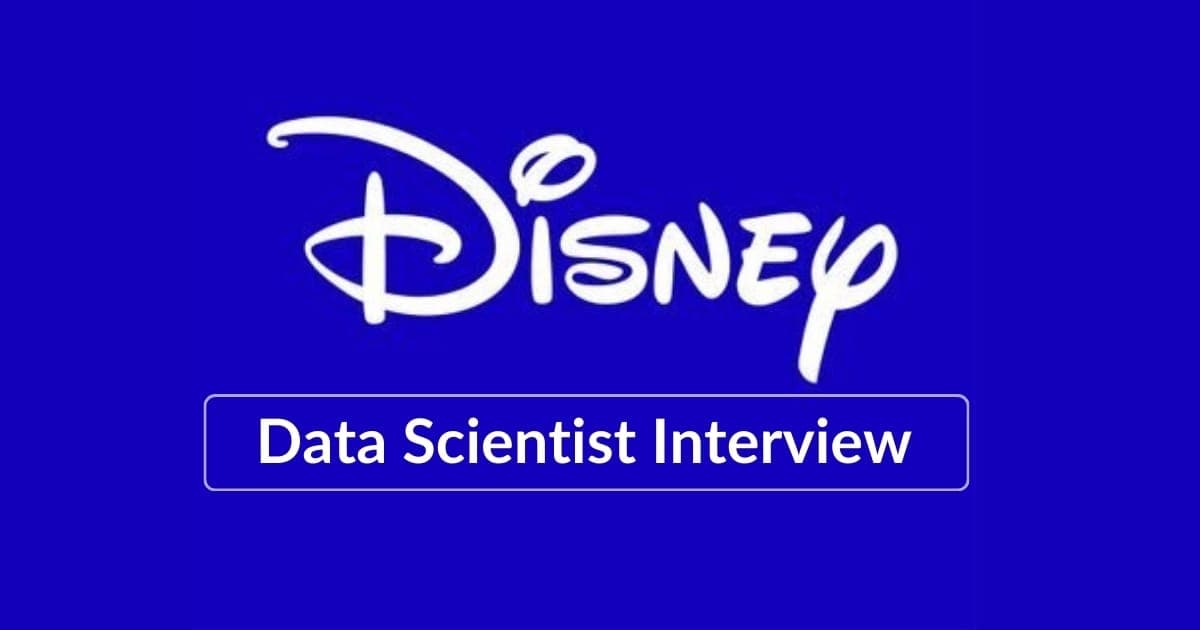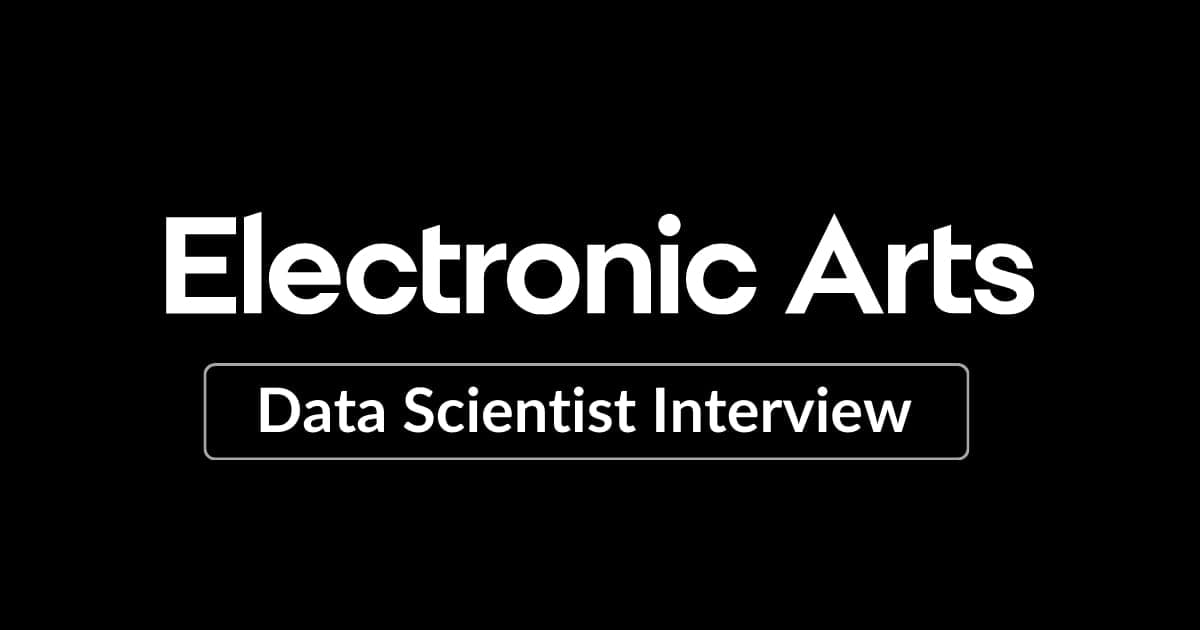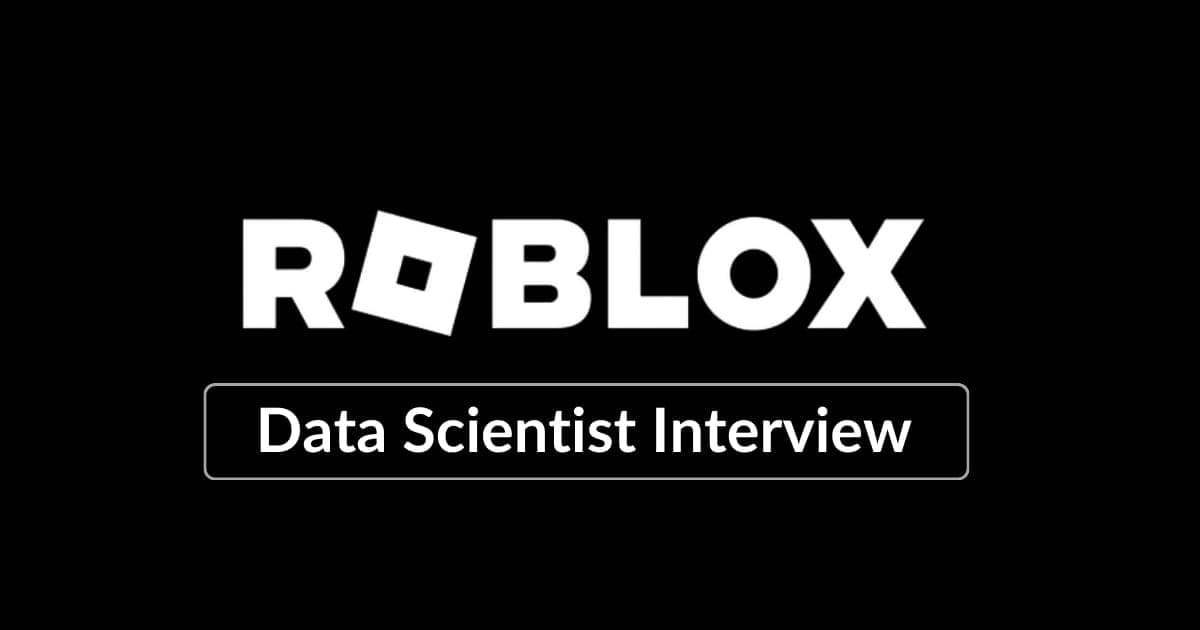Are you preparing for a Data Scientist interview at Disney? This comprehensive guide will provide you with insights into Disney's interview process, the key skills and qualifications they seek, and strategies to help you shine during your interview.
As a Data Scientist at Disney, you will play a crucial role in enhancing user experiences across platforms like Disney+, Hulu, and ESPN+. Understanding Disney's unique approach to data science and their emphasis on creativity and innovation can give you a significant advantage in the competitive job market.
In this blog, we will explore the interview structure, discuss the types of questions you can expect, and share valuable tips to help you navigate each stage with confidence.
Let’s dive in 👇
1. Disney Data Scientist Job
1.1 Role Overview
At Disney, Data Scientists play a pivotal role in enhancing the user experience across platforms like Disney+, Hulu, and ESPN+ through data-driven insights and innovation. This position requires a combination of technical proficiency, analytical skills, and a strategic mindset to derive insights that inform business decisions and optimize user engagement. As a Data Scientist at Disney, you will collaborate with diverse teams to tackle complex challenges and contribute to the creation of world-class entertainment experiences.
Key Responsibilities:
- Apply state-of-the-art machine learning and statistical analysis to develop models for opportunity sizing, targeting, and optimization.
- Analyze user behavioral data to identify patterns and uncover opportunities for enhancing service and content interaction.
- Develop prototype solutions, mathematical models, algorithms, and robust analytics to deliver impactful insights.
- Partner closely with business stakeholders to identify and unlock opportunities, and collaborate with other data teams to enhance platform capabilities.
- Design, build, and improve machine learning models to drive growth and retention of subscribers.
- Mine large data sets to identify opportunities for driving growth and retention of subscribers.
Skills and Qualifications:
- Bachelor’s degree in Mathematics, Statistics, Data Science, or a related field, with 7+ years of experience in developing machine learning models and conducting statistical analysis.
- Proficiency in Python and SQL, with experience in using machine learning frameworks like TensorFlow and scikit-learn.
- Strong understanding of statistical modeling, including regression and time series analysis.
- Experience with distributed data technologies such as Hive and Spark.
- Excellent communication skills to convey complex data insights to both technical and non-technical audiences.
- Desire to collaborate with other data scientists, data analysts, and key business partners.
1.2 Compensation and Benefits
Disney offers a competitive compensation package for Data Scientists, reflecting its commitment to attracting skilled professionals in the data, machine learning, and AI fields. The compensation structure includes a base salary, performance bonuses, and stock options, along with various benefits that support work-life balance and career development.
Example Compensation Breakdown by Level:
| Level Name | Total Compensation | Base Salary | Stock (/yr) | Bonus |
|---|---|---|---|---|
| Data Scientist | $142K | $124K | $13K | $4.9K |
| Senior Data Scientist | $171K | $136K | $16.7K | $18K |
Additional Benefits:
- Participation in Disney’s stock programs, including restricted stock units (RSUs) and the Employee Stock Purchase Plan.
- Comprehensive medical and dental coverage.
- Tuition reimbursement for education related to career advancement.
- Discounts on Disney products and services.
- Flexible relocation support and discretionary bonuses.
Tips for Negotiation:
- Research compensation benchmarks for data scientist roles in your area to understand the market range.
- Focus on Disney’s total compensation package, which includes stock options, bonuses, and benefits alongside the base salary.
- Highlight your unique contributions and experiences during negotiations to maximize your offer.
Disney’s compensation structure is designed to reward innovation, collaboration, and excellence. For more details, visit Disney’s careers page.
2. Disney Interview Process and Timeline
Average Timeline: 4-6 weeks
2.1 Resume Screen
The first stage of Disney’s Data Scientist interview process is a resume review. Recruiters assess your background to ensure it aligns with the job requirements. Given the competitive nature of this step, presenting a strong, tailored resume is crucial.
What Disney Looks For:
- Proficiency in Python, SQL, and statistical analysis.
- Experience with machine learning models and data-driven decision-making.
- Projects that demonstrate innovation, collaboration, and business impact.
- Familiarity with Disney’s products and services.
Tips for Success:
- Highlight experience with A/B testing, analytics, and product metrics.
- Emphasize projects involving machine learning and statistical modeling.
- Use keywords like "data-driven insights," "collaborative projects," and "SQL proficiency."
- Tailor your resume to showcase alignment with Disney’s mission of creativity and innovation.
Consider a resume review by an expert recruiter who works at FAANG to enhance your application.
2.2 Recruiter Phone Screen (30 Minutes)
In this initial call, the recruiter reviews your background, skills, and motivation for applying to Disney. They will provide an overview of the interview process and discuss your fit for the Data Scientist role.
Example Questions:
- Can you describe a time when your analysis directly influenced a business decision?
- What machine learning models are you most familiar with?
- How do you approach statistical analysis in your projects?
Prepare a concise summary of your experience, focusing on key accomplishments and business impact.
2.3 Technical Screen (1 Hour)
This round evaluates your technical skills and problem-solving abilities. It typically involves questions on Disney’s data systems, machine learning models, statistical analysis, SQL queries, and tasks like writing functions in Python.
Focus Areas:
- SQL: Write queries involving joins, aggregations, and data manipulation.
- Statistical Analysis: Explain concepts like hypothesis testing and regression.
- Machine Learning: Discuss model evaluation metrics and feature engineering.
- Data Systems: Understand Disney’s data infrastructure and analytics tools.
Preparation Tips:
Practice SQL queries and Python functions related to real-world scenarios. Consider technical interview coaching by an expert coach who works at FAANG for personalized guidance.
2.4 Onsite Interviews
The onsite interview typically consists of multiple rounds with data scientists, managers, and cross-functional partners. Each round is designed to assess specific competencies.
Key Components:
- Technical Challenges: Solve live exercises that test your ability to manipulate and analyze data effectively.
- Real-World Business Problems: Address complex scenarios involving A/B testing, machine learning models, or statistical analysis.
- Product Case Studies: Define key metrics, evaluate product performance, and propose data-driven improvements.
- Behavioral Interviews: Discuss past projects, collaboration, and adaptability to demonstrate cultural alignment with Disney.
Preparation Tips:
- Review core data science topics, including statistical testing, experiment design, and machine learning algorithms.
- Research Disney’s products and services, and think about how data science could enhance them.
- Practice structured and clear communication of your solutions, emphasizing actionable insights.
For Personalized Guidance:
Consider mock interviews or coaching sessions to simulate the experience and receive tailored feedback. This can help you fine-tune your responses and build confidence.
Disney Data Scientist Interview Questions
Probability & Statistics Questions
Probability and statistics questions assess your understanding of statistical methods and your ability to apply them to real-world scenarios.
Example Questions:
- What is the probability that a coin is double-headed and the next toss is a head after seeing 10 heads?
- Explain a statistical technique you have used in a project.
- How would you approach A/B testing for a new feature on Disney+?
- Describe the difference between Type I and Type II errors in hypothesis testing.
- How do you determine if a dataset is normally distributed?
- What is the Central Limit Theorem and why is it important?
- How would you handle missing data in a dataset?
For more insights on statistics, check out the Applied Statistics Course.
Machine Learning Questions
Machine learning questions evaluate your knowledge of algorithms, model building, and problem-solving techniques applicable to Disney’s products and services.
Example Questions:
- Will increasing the number of trees in a random forest model continuously improve its accuracy?
- Explain the bias-variance tradeoff and how it applies to building a predictive model.
- How would you design a machine learning model to predict customer churn for Disney+?
- Describe how you would evaluate the performance of a recommendation algorithm used in Disney+.
- What features would you prioritize for building a model to recommend Disney content to users?
- How do you handle class imbalance in a dataset when building a predictive model?
- What is your experience with machine learning models?
Enhance your machine learning skills with the Machine Learning Course.
SQL Questions
SQL questions assess your ability to manipulate and analyze data using complex queries. Below are example tables Disney might use during the SQL round of the interview:
Movies Table:
| MovieID | Title | ReleaseYear | Genre | Budget |
|---|---|---|---|---|
| 1 | The Lion King | 1994 | Animation | 45000000 |
| 2 | Frozen | 2013 | Animation | 150000000 |
| 3 | Avengers: Endgame | 2019 | Action | 356000000 |
BoxOffice Table:
| MovieID | DomesticGross | InternationalGross | TotalGross |
|---|---|---|---|
| 1 | 422783777 | 545700000 | 968483777 |
| 2 | 400738009 | 880000000 | 1280738009 |
| 3 | 858373000 | 1939000000 | 2797373000 |
Example Questions:
- Top Grossing Movies: Write a query to find the top 3 movies by total gross revenue.
- Budget vs. Revenue: Write a query to calculate the budget to total gross revenue ratio for each movie.
- Genre Analysis: Write a query to find the average budget and total gross revenue for each genre.
- Yearly Performance: Write a query to show the total gross revenue for movies released each year.
- Profitability: Write a query to determine which movies had a total gross revenue greater than twice their budget.
Business Case Studies Questions
Business case studies questions evaluate your ability to analyze business problems and propose actionable solutions using data-driven insights.
Example Questions:
- How would you select the best 10,000 customers for a pre-launch of a new show?
- What process would you use to pre-launch a TV show on Disney+ to measure its performance?
- How would you design an experiment to test the impact of a new pricing strategy for Disney+ subscriptions?
- What data would you analyze to identify factors driving churn among Disney+ users?
- If Disney wanted to expand its streaming services into a new region, what factors would you consider to assess market demand and profitability?
Learn how to approach business cases with the Case in Point Course.
4. How to Prepare for the Disney Data Scientist Interview
4.1 Understand Disney’s Business Model and Products
To excel in open-ended case studies at Disney, it’s crucial to understand their diverse range of products and services, including Disney+, Hulu, and ESPN+. Disney operates a multifaceted business model that spans entertainment, media networks, and theme parks, all of which are interconnected through data-driven strategies.
Key Areas to Understand:
- Revenue Streams: How Disney generates income through subscriptions, advertising, and merchandise sales.
- User Engagement: The role of data science in enhancing user experiences and driving content interaction across platforms.
- Content Strategy: How Disney leverages data to optimize content delivery and subscriber retention.
Understanding these aspects will provide context for tackling business case questions, such as analyzing subscriber growth or proposing data-driven enhancements to Disney’s streaming services.
4.2 Master Disney’s Product Metrics
Familiarity with Disney’s product metrics is essential for excelling in product case and technical interviews.
Key Metrics:
- Engagement Metrics: Daily active users (DAU), time spent on platform, and content consumption patterns.
- Retention Metrics: Churn rate, subscriber growth, and lifetime value (LTV) for Disney+ and other services.
- Revenue Metrics: Average revenue per user (ARPU) and subscription growth trends.
These metrics will help you navigate product case questions and demonstrate your understanding of data’s impact on business decisions.
Familiarizing yourself with these KPIs will help you navigate product case questions and demonstrate strong business acumen.
4.3 Align with Disney’s Mission and Values
Disney’s mission is to entertain, inform, and inspire people around the globe through the power of unparalleled storytelling. Aligning your preparation with this mission is key to showcasing your cultural fit during interviews.
Core Values:
- Creativity, innovation, and storytelling excellence.
- Collaboration across diverse teams and disciplines.
- Commitment to data-driven decision-making and user-centric solutions.
Showcase Your Fit:
Reflect on your experiences where you:
- Used data to enhance user experiences or content delivery.
- Innovated on existing processes or products.
- Collaborated effectively with diverse teams to achieve shared goals.
Highlight these examples in behavioral interviews to authentically demonstrate alignment with Disney’s mission and values.
4.4 Strengthen Your SQL and Coding Skills
Disney emphasizes technical proficiency, making SQL and programming skills essential for success in their data science interviews.
Key Focus Areas:
- SQL Skills:
- Master joins (INNER, LEFT, RIGHT) and aggregations (SUM, COUNT, AVG).
- Understand window functions and complex query building.
- Programming Skills:
- Python: Focus on data manipulation with pandas and NumPy.
- Machine Learning: Brush up on libraries like scikit-learn for model building and evaluation.
Preparation Tips:
- Practice SQL queries on real-world scenarios, such as user engagement and content analysis.
- Consider enrolling in a Data Scientist Interview Bootcamp for comprehensive preparation.
- Be ready to explain your logic and optimization strategies during coding challenges.
4.5 Practice with a Peer or Interview Coach
Simulating the interview experience can significantly improve your confidence and readiness. Mock interviews with a peer or coach can help you refine your answers and receive constructive feedback.
Tips:
- Practice structuring your answers for product case and technical questions.
- Review common behavioral questions to align your responses with Disney’s values.
- Engage with professional coaching services such as DataInterview.com for tailored, in-depth guidance and feedback.
Consider engaging with coaching platforms like DataInterview.com for tailored preparation. Mock interviews will help you build communication skills, anticipate potential challenges, and feel confident during Disney’s interview process.
5. FAQ
- What is the typical interview process for a Data Scientist at Disney?
The interview process generally includes a resume screen, recruiter phone screen, technical screen, and onsite interviews. The entire process typically spans 4-6 weeks. - What skills are essential for a Data Scientist role at Disney?
Key skills include proficiency in Python and SQL, experience with machine learning frameworks (like TensorFlow and scikit-learn), strong statistical analysis capabilities, and familiarity with distributed data technologies such as Hive and Spark. - How can I prepare for the technical interviews?
Focus on practicing SQL queries, Python coding challenges, and understanding statistical concepts. Be prepared to discuss machine learning models, A/B testing methodologies, and how to analyze user behavior data. - What should I highlight in my resume for Disney?
Emphasize your experience with data-driven decision-making, machine learning projects, and any collaboration with cross-functional teams. Tailor your resume to reflect Disney’s mission of creativity and innovation. - How does Disney evaluate candidates during interviews?
Candidates are assessed on their technical skills, problem-solving abilities, and cultural fit. Disney places a strong emphasis on collaboration, creativity, and the ability to derive actionable insights from data. - What is Disney’s mission?
Disney’s mission is to entertain, inform, and inspire people around the globe through the power of unparalleled storytelling, which is reflected in their data-driven approach to enhancing user experiences. - What are the compensation levels for Data Scientists at Disney?
Compensation for Data Scientists at Disney typically ranges from $124K to $171K annually, depending on the level of experience, with additional benefits such as stock options, performance bonuses, and comprehensive health coverage. - What should I know about Disney’s business model for the interview?
Understanding Disney’s multifaceted business model, which includes streaming services like Disney+, Hulu, and ESPN+, as well as its revenue streams from subscriptions, advertising, and merchandise, will be beneficial for case study questions. - What are some key metrics Disney tracks for success?
Key metrics include user engagement metrics (like DAU and time spent on platform), retention metrics (such as churn rate and subscriber growth), and revenue metrics (like average revenue per user and subscription growth trends). - How can I align my responses with Disney’s mission and values?
Highlight experiences that demonstrate your creativity, collaboration, and commitment to data-driven solutions. Discuss how your work has enhanced user experiences or contributed to innovative projects that align with Disney’s storytelling ethos.



